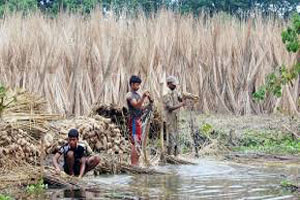
Traditional method of jute rotting causing serious pollution of water bodies in Bangladesh
YarnsandFibers News Bureau 2014-08-01 16:00:00 – RangpurJute farmers not so familiar with the new system of ribbon retting method, a technology for rotting jute plants with less water to get quality fibre are using old traditional method of jute rotting causing serious pollution of water as rotting of jute plant is going on in full swing in all the river and water bodies in the district.
Most of the farmers of the region are not acquainted with the ribbon retting method to separate fibre from jute stick and rot those in ditch to get the desired golden fibre. In this technology the separated fibre will be kept under water of ditch to decompose those properly, DAE official sources.
The size of a ditch should be six metre in length, two metre in breadth and one metre in depth where fibers are kept under water for at least 12 to 15 days.
Though the Department of Agriculture Extension (DAE) took an initiative to reintroduce the system but inadequate training and reluctance of the farmers the method is yet to get popularity among jute farmer.
It is also alleged that due to lack of measures for its promotion the method has not become successful among the local farmers. According to jute farmers of Mirzapur village under Mithapukur upazila they are not so much familiar with the system, some farmers were informed about the new system but they showed their reluctance.
Jute farmer of Chowdhurypara village under Taraganj upazila said that though Ribbon retting method is very easy but the duration of their training was not sufficient. However, if they got proper and adequate training on it the method will certainly get popularity among the farmers.
According to DAE official sources, DAE supplied ribbon retting machines among the farmers of the region for ensuring better quality of jute. But the farmers are not eager enough to use ribbon retting method, sources alleged.
Despite scarcity of water they are still adopting traditional method of jute rotting, and so, they are not getting good quality of jute and deprived of its fair prices.
During the current season, jute was cultivated on 12,650 hectares of land in 8 upazilas under the district. Harvesting of jute is going on in full swing across the region and the farmers are quite satisfied with the yield they have achieved so far.
Market Intelligence
Ask for free sample Report

experience
Customer Base
dedicated team
Countries Served Worldwide









